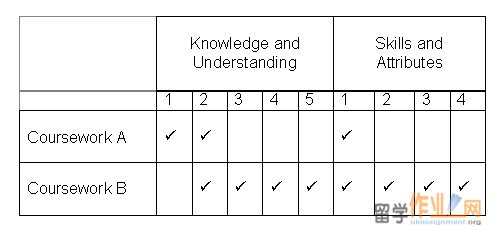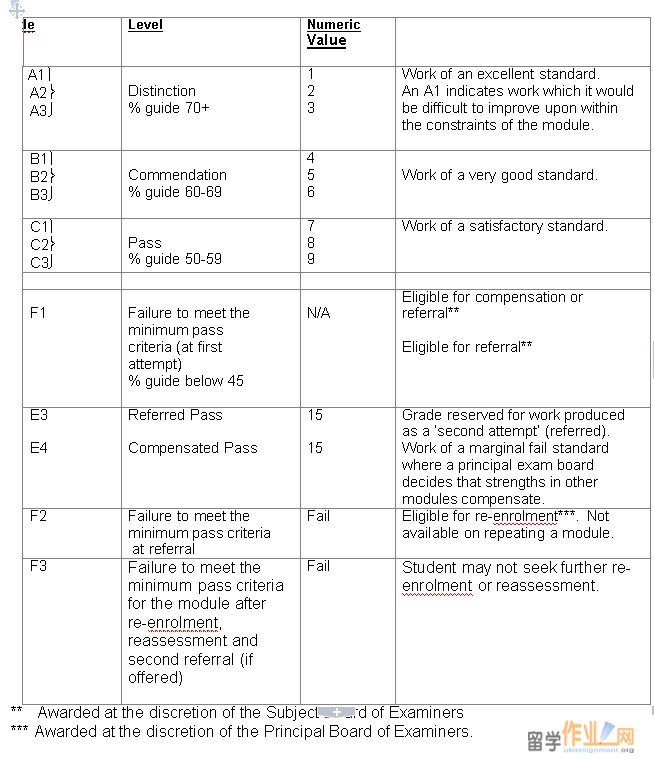|
1。模块代码:MBSP 0354 1. Module code: MBSP 0354
3. Credit points: 15 4. Level: M 5. Contact Details:
Edward Kerr
understand the financial problems specific to multi-national companies, together with the associated theory;understand techniques for managing these problems. 7. Module Intended Learning outcomes:
(a). Knowledge and Understanding:
9. Weekly programme: WEEK 1 - Week Commencing 05 OCT 09:
Lecture Theme: Introduction to the Module Text Book Reading: Chapters 1, 3 & 8 Seminar Content: No Seminars this Week WEEK 2 - Week Commencing 12 OCT 09:
Lecture Theme: International Monetary System - 2 Seminar Content: No Seminars this Week WEEK 3 - Week Commencing 19 OCT 09: Lecture Theme: Theories of International Finance Text Book Reading: Chapters 4 & 7
Seminar Content: Discussion of Topics Arising from Lecture & Text Book Readings WEEK 4 - Week Commencing 26 OCT 09: Lecture Theme: International Financial Markets.
Text Book Reading: Chapter 5 Seminar Content: Discussion of Topics Arising from Lecture & Text Book Readings
Lecture Theme: Devising a Foreign Exchange Management Strategy Discussion of Assessment
Text Book Reading: Chapters 10 & 11 Seminar Content: Discussion of Topics Arising from Lecture & Text Book Readings
WEEK 6 - Week Commencing 07 NOV 09: Lecture Theme: Techniques for Exposure Management Text Book Reading: Chapter 12 & 13 Seminar Content: Seminars this week will focus on the Multiple Choice Questions in Test Bank 1 (pages 164 to 166) and students should have attempted these questions prior to the seminars. In addition, students should have attempted Test Bank 1 (pages 161 to 164). Answers to the Multiple Choice questions are given at page 708. Answers to Test Bank 1 are given at pages 696 to 699 and problems arising from Test Bank 1 will be dealt with during the seminar. WEEK 7 - Week Commencing 23 NOV 09:
Lecture Theme: Multi-National Capital Investment - 1 Seminar Content: Discussion of topics arising from Lecture & Text Book readings. WEEK 8 - Week Commencing 30 NOV 09: Lecture Theme: Multi-National Capital Investment - 2 Text Book Reading: Chapters 23, 24, 25 and 26 Seminar Content: Seminars this week will focus on the Multiple Choice Questions in Test Bank 2 (pages 239 to 241) and students should have attempted these questions prior to the seminars. In addition, students should have attempted Test Bank 2 (pages 237 to 239). Answers to the Multiple Choice questions are given at page 708. Answers to Test Bank 2 are given at pages 699 to 701 and problems arising from Test Bank 2 will be dealt with during the seminar. WEEK 9 - Week Commencing 07 DEC 09: Lecture Theme: Current Issues in International Finance - 1 Text Book Reading: Guided Reading to be Advised Seminar Content: Seminars this week will focus on the Multiple Choice Questions in Test Bank 3 (pages 358 to 370) and students should have attempted these questions prior to the seminars. In addition, students should have attempted Test Bank 3 (pages 357 to 358). Answers to the Multiple Choice questions are given at page 708. Answers to Test Bank 3 are given at pages 701 to 703 and problems arising from Test Bank 3 will be dealt with during the seminar.
Lecture Theme: Current Issues in International Finance - 2
It will be noted that many of the Seminars include a discussion of topics arising from the Lectures and Text Book readings. In order to act as a focus for this activity, a number of specific questions are given at the end of the PowerPoint presentation for each Lecture.
Coursework/examination weight:
100% Coursework There are two pieces of Course Work: The first is a practical exercise to allow students to assess the reliability of International Financial Theory This will be posted on StudyNet on 02 NOV 09. The Due Date is Mon 30 NOV 09 The second is an analysis of a Case Study, which illustrates a potentially real-life scenario This will be posted on StudyNet on Mon 30 NOV 09. The Due Date is Mon 11 JAN 10.
Monday 28 JUN 09 10 (c) A matrix detailing Intended Learning outcomes (pre-numbered from section 8 (a) and 8 (b) above) with the mode of assessment as follows:-
(b) UHBS reserves the right to use electronic means to identify plagiarism.
The Grading Criteria is given as Appendix A to this Module Guide.
(b) Generally the knowledge and understanding required for a direct entry Student:
Not Applicable The information given in this Module Guide is believed correct, but the Business School reserves the right, at its discretion, and for any reason, to make changes to the Guide without prior notice and in particular: to make changes to syllabuses and modules for reasons including meeting technological or academic developments or employer's requirements particularly in specialists options; not to offer options, specialisms or elective modules within a programme of study where there is insufficient student demand.
In order to get the best from your studies and achieve your goals, the Business School expect you: to behave in an acceptable, respectful and considerate manner to fellow students, administrators and academic staff to realise that being a full time student is equivalent to having a full-time job requiring at least 35 hours per week self study in preparation for workshops, seminars, lectures and assessments to attend and participate in lectures, tutorials, workshops and other timetabled classes to be punctual in attending classes to turn off mobile 'phones prior to entering class to complete and hand in all assignments by the appropriate deadline to provide responsible feedback on your learning experience as requested to ensure you do not breach the University Regulations with regard to cheating, plagiarism and ethical issues to comply with any University and external regulations affecting your studies
APPENDIX A Postgraduate Grading Criteria
HOW YOUR POSTGRADUATE WORK WILL BE ASSESSED
A Grades Work of an excellent standard. An ‘A’ grade will count towards a Distinction on the programme as a whole. An A1 indicates work upon which it would be difficult to improve within the constraints of the module. A grade work: will have demonstrated excellent achievement of all the module learning outcomes will frequently be characterised by a degree of originality should demonstrate a thorough understanding of key concepts within the subject will, where appropriate, be characterised by the application of theoretical concepts to empirical issues with appropriate reflection requires that all of the elements of the question set will have been addressed will show evidence of reading beyond that specified by the tutor/examiner, reflecting a broad literature review will show an ability to approach reading with a critical understanding will show evidence, where required, of an ability to evaluate contrasting viewpoints and draw conclusions will demonstrate a degree of independence of thought, rather than relying simply on the ideas of others, perhaps as contained in the prescribed reading for the module will demonstrate an ability to analyse and synthesise information will always be written in a clear and concise manner, will be well constructed and the argument of the work will flow smoothly. will include an appropriate range of references using one of the recognised protocols. will normally be presented to a high standard. B Grades Work of a very good standard. A ‘B’ grade will count towards a commendation on the programme as a whole. B Grade work : will have demonstrated good achievement of all the module learning outcomes will demonstrate an ability to integrate theoretical concepts with business or management practice, where appropriate will address the key elements of the question set will usually show evidence of reading beyond that specified by the tutor/examiner
will provide evidence of a good grasp of prescribed literature will demonstrate evidence of independent thought will generally be written in a clear and concise manner with a good structure and a logically developed argument will normally be well-presented will include references using one of the recognised protocols for academic work
Work of a satisfactory standard. A ‘C’ grade will count towards a pass in the programme as a whole. C Grade work: will have demonstrated achievement of all the module learning outcomes will demonstrate attempts to integrate theory and practice, demonstrating understanding of both will demonstrate familiarity with, and understanding of, prescribed literature should demonstrate an understanding of the existence of alternative viewpoints, where these exist or where required by the question may incorporate evidence of independent thought will be generally coherent, though some weaknesses in structure or clarity may be evident will be presented to a satisfactory standard will include an indication of literature consulted, using the prescribed referencing protocol
F Grades Work of insufficient quality to achieve a Pass standard. It may be eligible for referral. F Grade work may suffer from some or all of the following defects: will have demonstrated achievement of few of the module learning outcomes fails to address the question set no attempt to integrate theory and practice little or no understanding of relevant theory and/or business and management practice little or no reference to appropriate literature little or no evidence of independent thought little or no evidence that the candidate has grasped key ideas is incoherent or has severe faults in its construction inadequate citation of appropriate literature makes unsubstantiated statements or assertions is unduly descriptive and/or lacks analysis is badly presented is late without having gained permission through the Business School procedures is unduly derivative of the work of others, for example, quoting or copying large tracts from published works
|
 |
|||
| 网站地图 |




